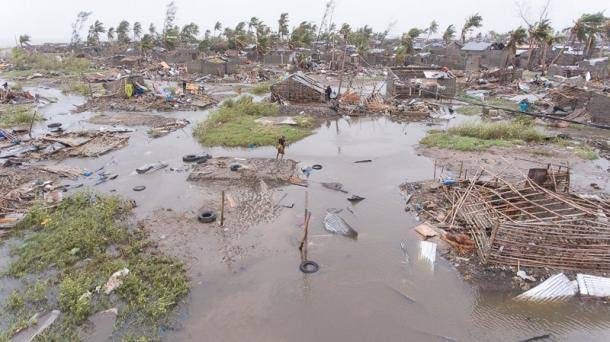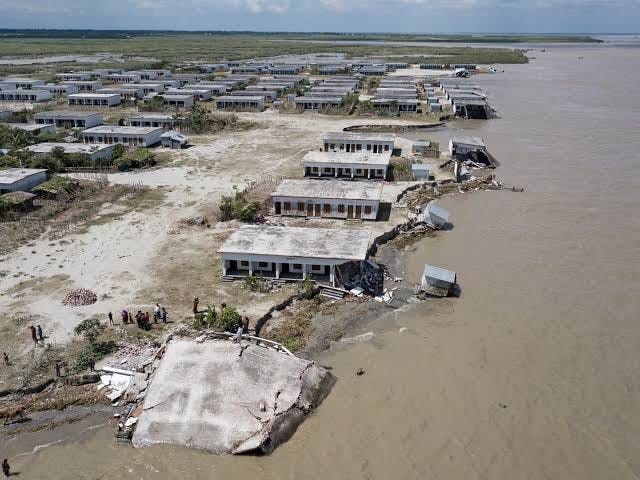Breaching the 1.5C Global Warming Level: Expected Impact on Africa
What happens to Africa if the 1.5C global warming level is breached within five years?
Just as we think our troubles belong to a distant future, events tell us they are near. Just as we think 1.5C global warming levels would be reached in 2030 or 2035 or 2040, new facts and investigations and reports tell us we may be wrong, that 1.5C global warming levels could be breached in the next few years. Just as we think we have a few more years of respite, a time to turn things around, a time to put our acts in order, a time to maneuver, the recent World Meteorological Organization (WMO) report indicates that we do not have the time we think we have, that 1.5C global warming limits could be breached within the next five years, that things have spiraled out of control.
Other scientists from places apart from WMO say the same thing. They say that global warming limits of 1.5C approaches, even though they don’t put the period within the next five years. The scientists, perusing through the Intergovernmental Panel on Climate Change (IPCC) report, express the same opinion about the breaching of the 1.5C global warming level, even if we reach zero-net greenhouse emissions in the next few years. Other scientists like Max Planck of the Institute for Meteorology in Hamburg say the same thing, that 1.5C could be breached by 2035.
In other words, it is inevitable that 1.5C global warming levels will be breached. It is non-negotiable that the 1.5C level will be breached with the way things unfold today, with the strong climate change denial pervading the globe. It is inevitable that we will exceed or reach the 1.5C global warming level as the IPCC report indicates, as the WMO report says in its latest publication, as scientists such as MaxPlanck predict, as scientists in the past four decades have been predicting, if we don’t find a way of cutting down drastically on the emission of greenhouse gasses.
Results of inaction about climate change, Credit, NRDC
It is inevitable for several reasons. Even as the 1.5C global warming levels stares us in the face, some countries plan to burn more coal to replace Russian gas supplies. Even as the scientists warn against greenhouse gas emissions, some countries still maintain their oil and gas facilities, which can only increase the level of heating in the world. Even as scientists claim we have already breached 1.1C global warming levels, some countries plan to build giant refineries to leverage on fossil fuel production, unconcerned about the harm to the already fragile environment around us, trumpeting the development as a sign of progress, with national leaders beating their chest with satisfaction and happiness and glee.
Unfortunately, setbacks occurred in climate cooperation between nations. Setbacks in climate cooperation occur through the ongoing war in Ukraine, which makes many countries to plan on burning more coal to replace Russian gas supplies. Setbacks in climate cooperation occur between poor and rich nations, which refuse to finance mitigation efforts of poor nations adequately, even though the climate dilemma in poor nations arises over the greenhouse gas emissions in rich nations.
Dangote Refinery, Credit, Guardian.ng
With the setbacks, poor nations continue to rely on fossil fuels to power their economies. Poor nations continue to lack access to renewable energy initiatives, while rich nations turn to the burning of coal over the Ukraine crisis. Poor nations such as Nigeria continue to plan the building of the Dangote Refinery, a potential source of greenhouse gas emissions on a large scale, while rich nations continue to finance fossil fuel production without thoughts for tomorrow, without thoughts about breaching the 1.5C global warming level, without thoughts about the consequences of breaching the limit.
For Africa, the fast-approaching period for the breaching of the 1.5C global warming level portends danger. It threatens to undo the continent’s modest development gains. It threatens to undo its infrastructural gains, and this causes sadness, because it contributes the least to global warming but remains the most vulnerable continent to climate change impacts. It threatens to create a greater level of poverty, since the incidence of the heat waves and droughts and floods will lead to job losses, and with millions having lost their jobs, poverty becomes the unenviable result.
Idai Cyclone hits Beria, Credit, WMO
Places with recent disasters won’t have enough time to recuperate before the effects of the 1.5C global warming level start to take effect. Beria in Mozambique won’t have the time to recover from the 2019 Cyclone Idai episode. Egypt won’t have the sufficient time to recover from what happened in 2015, when temperatures reached 48.4 degree centigrade. Seven African countries won’t have the time to face the challenge posed by the breach of the 1.5C global warming threshold, because they belong to the group of ten countries seen as the most vulnerable to climate change, with their energy infrastructure investments and their natural resources at a risk.
Rising seas, Credit, The Guardian
The coastal areas of Africa will also be vulnerable to climate change with the breach of the 1.5C global warming level in the next few years. They will suddenly have to deal with rising sea levels. They will have to deal with increased flooding, even though they have made inadequate preparations to face the challenges posed by the 1.5C global warming breach. They will not have sufficient time to deal with increased flooding and rising heat, not enough time to overcome their vulnerabilities by confronting issues such as frequent extreme weather events, poverty, disasters, with the lives of hundreds of millions of people suddenly becoming precarious.
It might be precarious as rain-fed agriculture dominates the landscapes of Sub-Saharan Africa. With a rain-fed agriculture, weather-sensitive events create vulnerable situations in terms of food security. With a rain-fed agriculture, weather-sensitive events threaten the ordinary herder, leading to job losses and emigration. With a rain-fed agriculture, extreme-weather sensitive events impact on poverty, the inevitable result of job losses and emigration, factors which might result in socio-economic tension through the rise in crime rates and other violent activities.
Drought in Namibia, Credit, Namibia Sun
The approaching breach of the 1.5C global warming level may lead to increased daily rainfall intensity in the Africa continent. In other words, the scenario of Egypt in 2015 could return. The scenario in southeast Africa could become a commonplace event, with the tropical cyclones that brought an unusual rainfall. The scenario in countries as far west as Namibia could stage a comeback in more extreme measures, when nations such as Namibia experienced the wettest month since 1976, when devastating floods resulted in the loss of lives, when societies seemed close to falling apart.
Sub-Sahara African farmers who practice rain-fed agriculture could fall apart with the coming temperature rise. Herders who graze on the African continent could also have their finances falling part, with the projected increase of droughts in the next few years. Nations such as Nigeria could also fall apart with the breaching of the 1.5C global warming level, especially as drought ravaged the area around the fast-drying Lake Chad, a factor that led to emigration, creating upheavals through the rise of the Boko Haram and Islamic State of West Africa Province (ISWAP) terrorists.
Obviously, keeping global warming levels to 1.5C or below could significantly bring down the frequency of extreme climate events on the continent. In hard terms, rich nations should lessen the rate at which they burn fossil fuel. Rich nations should control the rate at which their factories emit greenhouse gasses into the atmosphere, since if they continue at the present rate, the world’s temperature will continue to rise. Rich nations should lessen the rate at which they burn coal, as the world will continue to warm above the rate it warmed during the pre-industrial times, bringing near a situation where climate impacts will become increasingly harmful not only for Africans but for everyone living on the planet.
In addition, Africa contributes the least to global warming. Africa contributes the least to the abundance of greenhouse gasses, yet the continent faces exponential collateral damages. Due to the state of its socio-economic development, Africa contributes the least to these frightening events, yet climate change poses systemic risks to its economic structures, infrastructural development, food systems, public health, agriculture, and livelihood. It means while African countries must evolve adaptive and mitigation measures for their survival, the agents of her predicament must assist her in coping with the effects of changes not caused by Africa.
If Africa ultimately suffers from conditions created by other nations, it will be caused by rich nations who have refused to stop burning fossil fuel, who take a delight in engaging in coal production. If Africa ultimately becomes the victim of the activities of rich nations, it will not be her fault, but the fault of richer and more powerful nations, and the possibility of Africans becoming victims draws near with the breach of the 1.5C global warming level, which might take place in just under five years.









